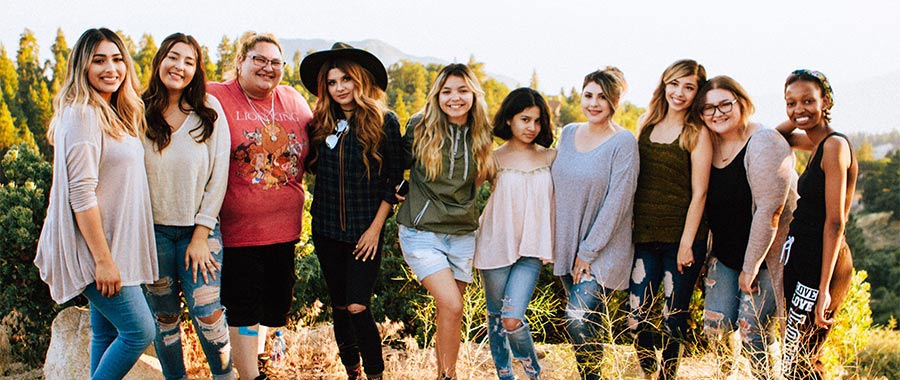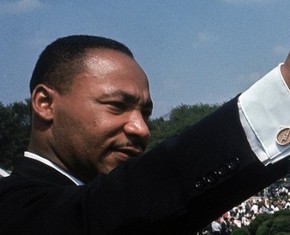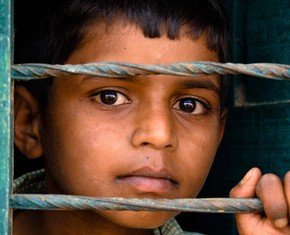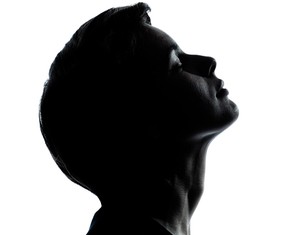The views expressed in our content reflect individual perspectives and do not represent the authoritative views of the Baha'i Faith.
Do you feel the waves—the waves of refugees flooding the world’s beaches and borders? Every day, they pound against my heart, filled with the desire for safety, for home.
My brain can’t compute the number of displaced people in the world today: over 70 million and counting, according to the United Nations.
In my own life, I have moved a lot. I know the hardship of establishing new roots and new community, over and over again. But I have never fled for my life, crossing deserts, wading through rivers, navigating the waters in a flimsy raft, escaping violence, prejudice, poverty, war.
My friend Lida has. Through her story, she has made those millions of refugees known to me and part of me. So I want to share her journey with you, because each of us has the ability to be refuge-makers. The Baha’i teachings ask us to give refuge to those who need it: “Should anyone seek refuge with you, extend unto him your protection and betray him not.” – Baha’u’llah, The Summons of the Lord of Hosts, p. 93.
We are not powerless in the establishment of justice. We are each filled with the capacity for peace.
I want to tell this story especially for my mother and father. For their sacrifice. They sacrificed everything to leave Iran and seek freedom. And they mostly did it for me, their youngest daughter. As a woman, I would have had fewer opportunities in Iran. I want to thank them for all their hardship. They risked everything–for me. – Lida T.
I was about seven when Lida entered our lives. She was my parents’ friend, a broad-shouldered, hazel-eyed auntie, with an accented voice I knew as Persian. As an American Baha’i, I had grown up with lots of Iranian friends, so I was familiar with the rich cadences of Persian (Farsi). Lida was so solid, gentle, strong. Like a deep-rooted oak, I was sure nothing could blow her over or rustle her composure.
Little did I know.
Five years ago, Lida asked me to write her story. “Now is the time. Tell my story. I want others to know they are not alone. And there is hope—and even happiness—waiting close-by.” So, over the course of many conversations, I wrote about her escape and exile, at age 17, from Iran, through Baluchistan, Afghanistan, Pakistan, and ultimately, to the United States.
As Baha’is, Iran’s largest non-Muslim religion, Lida’s family was under constant threat during the Islamic Revolution. When her brother-in-law Fereydoun was arrested for basically “doing business while being Baha’i,” her parents decided to flee their country.
As I sat with Lida in her ivory living room, in suburban Maryland, the darkness she’d been living with since 1982 unfurled. I could taste the dirt in my mouth, as she and her family crouched under metal trucks, in the Afghan mountains, hiding from thieves. In her retelling, the darkness became a vivid presence:
The darkness of driving through midwinter Iran, a caravan of three cars, carrying 18 souls into freedom—or death …
The darkness of the pasdaran (Revolutionary Guards) trailing them…
The darkness of the borderlands, where she ran to the waiting trucks of Baluchi smugglers…
The darkness of being lost, for days, without food or water, in the Afghan mountains.
In contrast, Lida’s home fills with light. Crystal bowls hold persimmons and pears. Silver picture frames gleam with family treasures, old black-and-white wedding photos of her “Maman and Baba,” a beautiful picture of her grandmother, Sultan.
Sultan died right before Lida’s family left Tehran. But the hospital, the morgue, and the cemeteries rejected her. “Even our dead bodies have no freedom there,” Lida’s voiced flashed with uncharacteristic hurt.
“We kept my grandmother in our bathtub for days, surrounded by ice. We were so afraid—if anyone found a dead body in a Baha’i home, we could have been arrested on false charges. Finally my father found a plot, in the ‘outcasts’ cemetery, where thieves and murderers were buried.”
Sultan is the kind of Iranian woman who rarely had a voice—until now. Lida remembers her as quiet, self-effacing, sweet. She never complained, something I constantly hear about Persian women and Iranian Baha’i refugees. Yet in Lida’s retelling, Sultan took on a force and authority that rose, dazzling, beyond death. Her spirit acted as a comfort and guide to Lida, who was a teenager at the time of her escape:
Cast not out, I entreat Thee, O my Lord, them that have sought Thee, and turn not away such as have directed their steps towards Thee, and deprive not of Thy grace all that love Thee. Thou art He, O my Lord, Who hath called Himself the God of Mercy, the Most Compassionate. Have mercy, then, upon Thy handmaiden who hath sought Thy shelter, and set her face towards Thee. – Baha’u’llah, Prayers and Meditations, p. 148.
Sadly, the situation for Baha’is in Iran hasn’t altered considerably since the Islamic Revolution. The seven Baha’i leaders, lovingly known as the Yaran (“Friends of Iran”), were only recently released from multi-year prison sentences. University students continue to be harassed and banned from higher education. Baha’i business are shut down on trumped-up charges. Baha’i citizens of all ages continue to be abused, arrested and imprisoned.
That said, while official policies of exclusion and harassment of Baha’is continue, the people of Iran are a different story. Public opinion has begun to change, as more individuals encounter Baha’is, and realize that, contrary to propaganda, they are kind, hard-working, devoted citizens, many of whom choose to stay in Iran despite the danger. If they leave, they spend their lives establishing Iranian culture in other parts of the world.
The power of interfaith friendship is apparent in Lida’s story too. In Iran, it is not unusual to employ a housekeeper, typically a lady who helps manage daily chores. For Lida, this housekeeper was Salimeh, a Muslim woman, who became, over the years, part of the family.
Salimeh struggled with her health, and Lida’s mother, Shokouh, took care of her. In Islam, it is considered “unclean” to touch the bodily fluids of another person. Yet Shokouh washed Salimeh’s garments, even her soiled laundry.
Shokouh’s actions—literally rolling up her sleeves, and helping to bathe and care for another woman—proved that Baha’is, who are considered “unclean” by many Shi’a Muslims, are not afraid of confronting social norms. For Baha’is, purity is a state of heart and mind, not a matter of what faith or race you belong to.
Lida has been an American citizen for many years now. She works for the U.S. Government’s Food and Drug Administration, finally able to openly practice the Baha’i Faith. She serves as a bridge between Iran and the U.S., nations in almost constant conflict. Her faith calls her to be aware of suffering, and to be a cause of joy and well-being, for herself and others.
In her original message to me, asking my help to write her story, Lida wrote:
I love your family very much and your mom Jackie was very dear to me. She is in the same cemetery where my mom, dad and nephew are buried. Whenever I visit my family I visit your mom too and read a prayer for all of them.
Contrast this pure love and friendship with the hateful, tension-filled words being flung from Washington D.C. and Tehran.
Lida proved her love for my family with more than words. In 2010, my mother, Jacqueline, was dying from a recurrence of ovarian cancer. Many people came to visit her in hospice. But on that last night, I thought it would be only my father and myself.
I was wrong.
Lida was there, along with Hoda and Hala, two Palestinian sisters. Here were women from war zones, women in exile, standing with us, warrior spirits glowing golden in the corners of my eyes.
















Comments
Sign in or create an account
Continue with Googleor